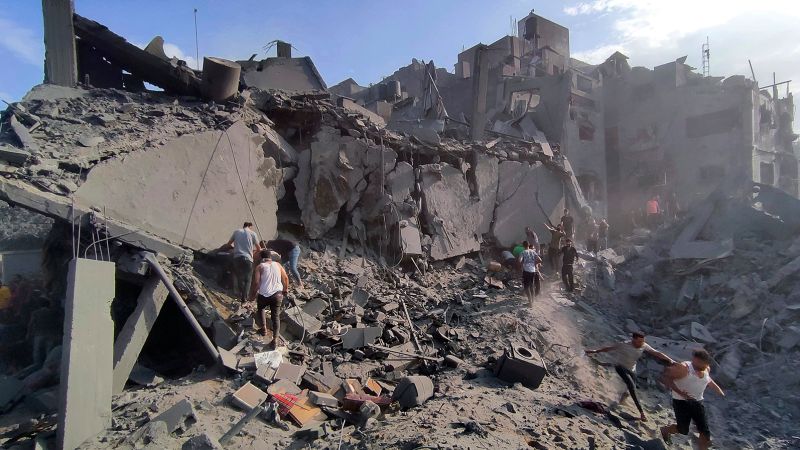Editor’s Note: A version of this article first appeared in the “Reliable Sources” newsletter. Sign up for the daily digest chronicling the evolving media landscape here.
News organizations are assuming a more aggressive posture toward Israel Defense Forces as it escalates its military operations in the Gaza Strip.
While civilian deaths mount and the humanitarian crisis grows more severe in the Palestinian territory, spokespersons for Israel’s military are being confronted by anchors on live television, pressed to answer for the deaths of innocent families caught in the heavy crossfire.
The more critical stance has been particularly pronounced over the last 24 hours, following two blasts at the densely populated Jabalya refugee camp in northern Gaza, which was established in 1948 when Palestinians fled what is now the current state of Israel.
The IDF said it was responsible for both blasts, having targeted a senior Hamas commander and dozens of other militants.
The killing of civilians — accompanied by horrifying stories and images from the ground — has prompted global outcry, and television news networks noticeably adjusting their demeanor in kind, putting the IDF in the hot seat during interviews that have taken place after the explosions.
CNN’s Wolf Blitzer, notably and repeatedly, pressed two IDF spokespersons on Tuesday evening, bluntly asking the military figures whether they carried out the first strike knowing that women and children would be among the casualties.
In a blunt and revealing answer, Lt. Col. Richard Hecht said, “This is the tragedy of war.”
The tough questions have not stopped there. In the hours since, IDF representatives have been grilled for answers by ABC’s Ian Pannell, MSNBC’s Symone Sanders, and CNN’s Dana Bash.
Pannell asked Lt. Col. Jonathan Conricus how he could be certain that dozens of Hamas combatants were killed in the operation, but had no confirmation at the time on whether civilians were also killed.
“I’m slightly confused,” Pannell candidly said.
Meanwhile, Bash asked Major Doron Spielman twice if the IDF could provide evidence supporting its claims that a senior Hamas leader was killed. Spielman did not offer any direct evidence, saying “it will become clear” when “that terrorist does not surface.”
As scrutiny of the attack grew, the United Nations’ Human Rights Office expressed concern that the airstrikes on the refugee camp “could amount to war crimes.”
“Given the high number of civilian casualties and the scale of destruction following Israeli airstrikes on Jabalya refugee camp, we have serious concerns that these are disproportionate attacks that could amount to war crimes,” it said.
With Israel’s ground operation in the Gaza Strip continuing to expand in the days and weeks ahead, and with the deaths of even more civilians tragically in the cards, journalists will play a key role in holding military and government officials to account for their actions.
Read the full article here




